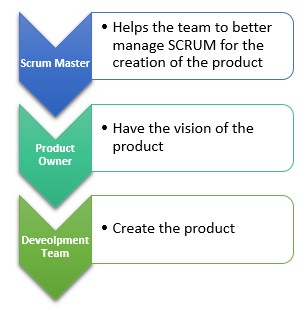The Certified Scrum Master helps the project team in using Scrum, which increases the chances of the project being successful. The Certified Scrum Master has full knowledge of the principles, practices and standards for the Scrum application and gives the organization a level of knowledge and experience that goes beyond those of a traditional project manager. A Certified Scrum Master acts as a “servant leader” helping other members of the Scrum team to work together and better assimilate the Scrum framework.
Functions of a SCRUM Team

Certified Scrum Master (CSM) Course
During the two days of the course you will learn to apply the Scrum framework to build a new product. In which you learn by feeling yourself a member of a Scrum team -experiencing many of the challenges you might encounter in real life – while being trained by an instructor involved in the Scrum application in many organizations. This way of learning by “doing” demands an open mind and an active participation.
Experimental activities and discussion of advanced concepts are applied, such as the use of Scrum in organizations with multiple teams, how to measure progress in an empirical way at a macro level, and why a simple framework can make an organization become the best possible.
Some of the topics covered by the Certified Scrum Master course are the following:
- Introduction to Scrum
- Roles and Responsibilities in Scrum
- Agile Requirements Analysis
- Estimation and Prioritization of the Product Backlog
- Sprint Planning, Execution, Review, and Retrospective
- What does “Fact” mean?
- Technical Debt and other Errors
- Release Planning based on Empirical Measurements
- Scrum in Organizations with Multiple Teams
Participants who successfully complete the course will obtain Certified Scrum Master (CSM), the first step to become a Certified Scrum Practitioner (CSP).
It can be considered that there are three certifications the most prestigious and internationally recognized:
Certified Scrum Master (CSM)
It is the first Scrum Master certification and is issued by the Scrum Alliance, a prestigious body founded by one of the creators of Scrum, Ken Schwaber. Scrum Alliance, an organization that seeks to promote the use of the Scrum working method and agile methodologies in general, as well as the organization of conferences and events related to the tool. In addition, it offers professionals interested in the Scrum domain a series of certifications to endorse the proper use of the tool, regardless of the sector in which they operate.
The certifications are:
- Certified Master Scrum (CSM): essential to understand Scrum’s practices and values and application strategies.
- Certified Scrum Product Owner (CSPO): focuses on the function of the Product Owner, which corresponds to the client of each project.
- Certified Scrum Developer (CSD): certifies the mastery of the Scrum principles and the skills required for its implementation.
- Certified Scrum Professional (CSP): aimed at professionals who have achieved the three previous certifications and demonstrate their experience in the domain of the tool,
- Certified Scrum Coach (CSC): this certification is aimed at scrum experts, both in theory and in the practical level.
- Certified Scrum Trainer (CST): professionals who reach this degree are trained to teach CSM and CSPO courses. To do this, they must pass a demanding process of selecting the Scrum Alliance.
- Registered Education Provider (REP): this program is aimed at professionals and organizations that offer Scrum courses, either with the guidelines of the Scrum Alliance or with others.
Professional Scrum Master (PSM)
In 2009, Ken Schwaber retired from the Scrum Alliance and created Scrum.org offering the Professional Scrum Master course, among others. Scrum.org offers Professional Scrum Master I and II (PSM I and PSM II) certificates.
PSM Indicates a basic level of understanding and PSM II indicates an intermediate level of understanding. To date, Scrum.org has issued more than 13,000 certificates. The Scrum.org has the following courses: Professional Scrum Foundations, Professional Scrum Master, Professional Scrum Developer and Professional Scrum Product Owner. The Professional Scrum Master course is the one with the two levels of PSM I and PSM II certification described above. The Scrum.org certification requires a minimum score of 85% on the exam. The cost of the PSM I exam is US $ 100 and that of the PSM II of US $ 500 and taking the exam is free, that is, you do not need to have taken the course before (although it is not necessary, the surveys indicate that taking the course is mandatory, especially for the PSM II). If you decide to take the Professional Scrum Master course you will receive a password to take the PSM I certification exam. The course is offered through Professional Scrum Trainers that work on standardized materials.
Project Management Institute (PMI)
The Project Management Institute (PMI) is one of the largest professional member associations in the world with a half million members and individuals holding their certifications in 180 countries. It is a non-profit organization that advances the profession of project management through standards and certifications recognized worldwide, through collaborative communities, an extensive research program and professional development opportunities.
The PMI offers a series of certifications that recognize knowledge and competence, including the certification of the Project Management Professional (PMP) that has more than 370,000 licensees around the world. The salaries and professional development opportunities of the individuals holding our certifications demonstrate that employers recognize the value delivered by trained professionals.
Project Management Institute, a prestigious institute that issues the PMP (Project Management Professional) certification, had not shown much interest in agile methodologies initially, rather, quite the opposite. However, he ended up rectifying by taking his own certification, PMI_ACP (PMI Agile Certified Practitioner).
The PMI standards for the management of projects, programs, and portfolios are the most recognized in the profession, the model for the management of projects in government and in business.
Thousands of PMI volunteers with experience in these types of projects develop and update these standards and provide a common language for project management around the world.
